
A soundtrack can make or break an anime. A good soundtrack can emphasize the emotional beats of the animation you're watching on screen, deepening the experience. A series with as much style as Bleach demands a good soundtrack and Shiro Sagisu's iconic music more than rises to the occasion.
Our friends at Sony Music Masterworks and Milan Records recently released eight volumes of Bleach music, and they were kind enough to help us host an interview with series composer Shiro Sagisu! Check out the series music available on all major streaming sites below, and after that check out our interview where we cover Sagisu's long history with music and the special connection he had with the director of the first Bleach anime series!
Listen to the Bleach soundtracks here!

Could you please introduce yourself and describe your career?
Shiro Sagisu: My name is Shiro Sagisu and I am a composer. I do other various jobs as well, but I am mainly a composer. I've been composing for about 46 to 47 years.
How did you get into composing music? Were you always interested in music?
Sagisu: There are two big things that drew me to this career. One of them was that about 60 years ago, my neighborhood had a Catholic church where I was taught piano and violin, around the time I was four or five years old. At that time, it was very rare in Japan to have a Catholic church in the neighborhood.
The second thing is also a very, very rare scenario. My father actually owned a studio that produced anime and tokusatsu series. I pretty much grew up with someone like a Japanese Walt Disney, and I was able to live a life inside of a studio that was right next to my home, which was a very rare situation growing up. It was not just music, but I grew up very closely to entertainment itself.
What do you think the job of a soundtrack in anime is? What should a composer aim for when working on the soundtrack?
Sagisu: As I mentioned in the previous question, since my house was next to an animation studio, I understood how the anime industry worked at a very early age. I also recognized how important music is, whether in anime or film scores. While a normal person would have to wait until they were around age twenty to learn these lessons at a university, I was learning them from my father at age five or six. It is very important to me that I was able to be in that industry environment at such an early age.
You asked uh what they should, what a composer should aim for to work in a soundtrack. The job of the soundtrack in anime has been changing as the years progress. 50 years ago, it was a very othodox, stereotypical job for a soundtrack. But nowadays, because animation itself is becoming more and more creative and unique, the composers also have to match the aesthetic of each original anime. That's what's important about modern anime soundtracks right now.
How were you first approached to do the soundtrack for Bleach?
Sagisu: I used to mainly do film scores, but I also wrote songs for singers and musicians as well within SONY. A producer at SONY was producing one of the singers I used to write for, and he decided to create a company called Aniplex within SONY, which, I'm sure you all know, is an anime-oriented company.
So then, after I met this person, he offered me a job writing for Bleach, which was an anime that they were going to start the year after we had met.

What was your experience with Bleach prior to creating the soundtrack? Did you read the manga?
Sagisu: Shonen Jump is one of the biggest sources of media in Japan, practically everyone knows of it. Because of that, I knew of the Bleach series, but I am a very busy person so I unfortunately didn't have the time to read it beforehand. I knew of the series, though. Because Shonen Jump is such a big part of the entertainment industry in Japan, anyone working in entertainment needs to know which manga are trending and which ones are syndicated within Shonen Jump in order to keep up with the times. I knew of Bleach because of that.
Did you collaborate with the director, Noriyuki Abe, while producing music for the past series? Did he have much influence on your work?
Sagisu: I only have great memories with Abe, the director. I feel that we had a very good relationship, though I am a bit sad because I have to say that in the past tense.
We were able to talk about anything together and one great thing about creating the Bleach music is that there wasn't anyone between us. There was no Music Supervisor which is a very rare scenario for anime music making. Because we were able to talk face-to-face we were able to talk about everything, and it feels to me that's why the music for Bleach came out so special—because we were able to have such an intimate connection and relationship.
For any work I took on after Bleach, I have always tried to make sure I got to have this intimate sort of connection with the director. I realized that was very important in making a good soundtrack.
I actually do hear a lot of fans say that your music is such a perfect fit for Bleach. How do you think your music fits with the themes and the tone of the series?
Sagisu: Let me say that's a very simple answer, but it's connected to the previous one. Abe, the director, gave me the freedom to compose as I wished, so I was really able to show my colors in the music I wrote. That's what really helped the music fit perfectly.
When I think of the Bleach soundtrack, I think of a mix of traditional instrumentation and more stylish or heavy elements. How would you describe the style of the music in Bleach?
Sagisu: This is also a simple answer that connects to the previous one! The music in Bleach really represents the music of my life. This is my representation. I like to mix a lot of elements and I pretty much represented everything I like within Bleach's music.
I can really hear all the love and care in the music, and I think a lot of fans do, too, so they react so positively to it.
Sagisu: I'm very happy to hear that!
As someone who's composed for both live action and anime, how do the two mediums differ when it comes to creating music for them?
Sagisu: That probably differs a lot depending on who the composer is. If I go into too much detail, I won't be able to finish in a day, so I'm going to shorten it a bit. I don't change anything depending on whether it's live action or anime. What's more important is my relationship with the director and what the director wants to do with the piece. It's more important to understand what sort of relationship I have with the director and what direction they want to go in with what they've created.
But, again, it depends on the composer. This is just how I think, and it probably differs from composer to composer.
What do you hope sticks with people when they hear your music while watching Bleach?
Sagisu: I mentioned this earlier, but music and animation are developing every day. I want people watching to sense that evolution and how things are changing day by day, and how it's evolving through the music.
Is there anything else you'd like to say to fans of your music around the world?
Sagisu: One thing that I want everyone to know is that the fans and I are now connected. 20-30 years ago it wasn't anything I could really imagine at the time. Nowadays, through social media and networking websites, everyone is connected. You can put out whatever you're thinking in the moment, you can share a sound you want everyone to hear in the moment, instantaneously, which is a very, very strong connection to have between fans and a composer. I want to use that positive point in social media and networking sites to connect and maintain that connection with everyone. I have a Twitter, so feel free to follow me!
Whether it's America or Europe, I'm always traveling. It doesn't happen very often in Japan, but in places like Europe, wherever I put my name down, whether it be at the post office, a hotel, or a restaurant, fans come up to me and ask about my music and about the music of Bleach. I'm very happy about that!

Listen to the Bleach soundtracks here!
About Shiro Sagisu:
Born in Tokyo in 1957, Shiro SAGISU is a composer, arranger, and music producer who has been at the forefront of the music industry for 44 years since his participation in a Jazz fusion band T-SQUARE’s major label debut in 1978. He has worked on thousands of songs and artists in a wide range of genres, Pop music, Jazz, Gospel, R&B, Rock and Classical crossover, as well as Film and TV scores. He has always produced a huge number of hits and has recently worked with artists such as MISIA, Ken Hirai, SMAP, Taro Hakase, JUJU, Yoko Takahashi, Mika Nakashima and many others. He has been active in Europe since 1990, running a club in Paris and working with artists from the UK and France. Since then, internationally, based in London, Paris and Tokyo. The collaboration with film director Hideaki Anno has lasted for more than 33 years and has enthusiastic fans all over the world. From his first major album EYES (1979) to his SHIRO’S SONGBOOK series (1999-2022), he has constantly released his own works, including four-disc sets, two-disc sets and DVD. In addition, following in the footsteps of his father, Soji Ushio (1921-2004), he leads P-productions, Manga, Animation and Kaiju studios, and runs the company. Recent works include the orchestration of the Japanese national anthem 'Kimigayo' for the opening ceremony of the 2020 Tokyo Olympics, the fanfares and marches at the JRA racecourse, EVANGELION series complete works (TV and Film), MUSA (film), BLEACH series complete works (TV and Film), Berserk series complete works (TV and Film), ATTACK ON TITAN (2 films), Shin Godzilla (film), Shin Ultraman (film), Genshin Impact (Game), etc.
---
Cayla Coats is the Editorial Partnerships Manager at Crunchyroll News. She tweets @ceicocat and you can watch her rarely updated YouTube channel here.
Source: Latest in Anime News by Crunchyroll!

Comments
Post a Comment